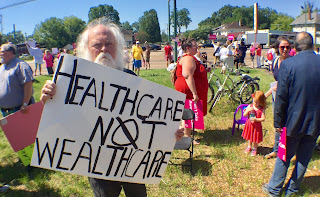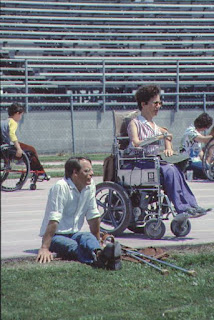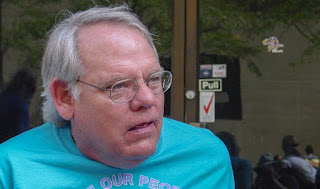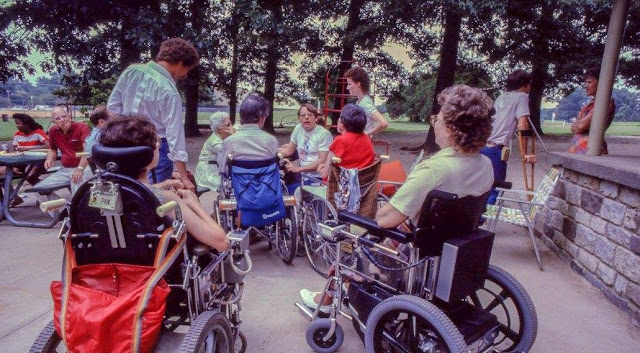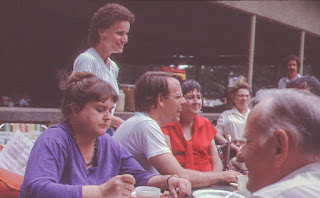I will be the gladest thing under the sun.
I will touch a hundred flowers and not pick one.
I will look at cliffs and clouds with quiet eyes
Watch the wind bow down the grass
and the grass rise
And when the lights begin to show
up from the town
I will mark which must be mine
And then start down
Edna St, Vincent Millay
Afternoon on a Hill
I am here to tell a story about my late husband, Louis Patrick, and about a political movement and organization that was very important to him and has become very important to me as well.
In 1950, when he was three years old, Louis contracted polio, also called infantile paralysis. In the first half of the twentieth century there were a number of epidemic waves of this disease. The worst and final wave of American cases was in 1952, two years after Louis contracted polio.
Because the Salk and Sabin vaccines then immunized most American children and almost eliminated polio from the world, the numbers of survivors of polio are dwindling today, but while they were still a large population, many of that group led the disability rights movement in the sixties and later the independent living movement that caught fire in the eighties.
Other people with disabilities also led in these developments, especially veterans of the Second World War, but the polio group was certainly a significant factor. As I got to know Louis in the sixties, I noticed that many survivors of polio viewed obstacles to their mobility as solvable puzzles, rather than insuperable limitations.
I like to think that part of the reason for this attitude was the example set by a very great man who contracted polio as an adult, a man my husband and I both admired very much even though he died before we were born. That man, of course, was Franklin Delano Roosevelt, the only president elected four times, and by whose achievements all subsequent presidents have been measured, and, in my view, found wanting, including great expectations for a new president’s first hundred days.
After FDR died, a Constitutional Amendment prevented anyone else from being elected more than twice, although it is unlikely that many of FDR’s successors could have achieved such a thing anyway, any more than they have met the standard of the Hundred Days.
FDR had been to the manor born and led a charmed life, with a promising political career, until 1921 when he became ill after visiting a Boy Scout camp. He never regained the use of his legs and might have spent the rest of his life as a secluded invalid except for his wife Eleanor, who supported, and may have even insisted on his return to politics.
To regain his strength as well as his morale, Franklin bought and refurbished a dilapidated resort in Warm Springs, Georgia and turned it into the first major institution for the treatment of infantile paralysis. I think the fact that most of the other residents at Warm Springs were children had a lot to do with FDR regaining his customary buoyant good spirits. At Warm Springs, FDR learned all he could about polio, developing new forms of treatment, a new design for crutches, and a system of hand controls that made it possible for him to enjoy driving his own car.
In 1928, just before the Great Depression threw the whole nation into shock, he officially re-entered political life, ran successfully for the office of governor of New York and then, in 1932, was elected for the first time as president. His first two administrations were consumed with addressing the Great Depression and the remainder of his presidency was spent in the effort to defeat fascism and forge a new international world order.
Both of these challenges were massive. Earlier presidents had despaired of the possibility of reversing economic catastrophe or breaking the pattern of stumbling from debacle to debacle in a world with appallingly and increasingly destructive military technology. FDR, however, sought experimental approaches to these intractable problems and was more successful than anyone thought possible.
At his inauguration, FDR told the nation that the main obstacle to recovery from the depression was fear itself, the panic and despair that made most people afraid to spend money or hire people or start businesses. In 1941, just before the US became officially involved in the war against fascism, FDR gave a speech that listed Four Freedoms as the essence of a civilized world, ideals he believed that even the most isolationist, America First citizens would consider worth fighting for: Freedom of Speech and Religion and Freedom from Want and Fear.
The first two of the Four Freedoms were already embraced with pride by most Americans. Freedom from Want or destitution was less traditional, since Americans had always thought that poverty was a personal fault. The Depression taught a lot of Americans, at least temporarily, that it was irrational to blame the poor for poverty, that it could strike anyone, and that economic security might be a civil right.
Freedom from Fear, however was something new for Americans to embrace. In that speech, FDR seems to have been referring, primarily, to bringing an end to international military aggression, but he also knew that the spread of fascism had brought with it the brute politics of exterminating hatred, a fanatical program to rid the world of all people who did not fit the fascist ideal of normal. He also knew well that, for people with disabilities, the first obstacle to living fully was fear in all its manifestations, one’s own fear of risk and the fear that other people felt toward people with disabilities.
For generations, families had often kept relatives with disabilities secret or at least out of sight, as a genealogical defect, a source of social stigma. People who did not have disabilities also expected to be spared the sight of those who did, and this irrational dread of seeing or being seen was among the most serious barriers to full participation of people with disabilities in their own communities.
I think it can be safely said that no one is more visible than a president of the United States. The privileged life that FDR had led gave him a powerful self-confidence, but even he went through a period of mourning for his old self when he first loss the use of his legs.
Even though he refrained from drawing undue attention to his disability, most people, especially in Congress and the press, were well aware of FDR’s condition. Certainly, with such an example, it would be really difficult for polio survivors to see themselves as helpless. When Washington D.C. finally got around to creating an FDR memorial, disability rights advocates protested that none of the sculptures showed him in a wheel chair, which would help dispel the stigma of disability.
I met and married Louis in 1968, a year of terrible shocks that included assassinations as well as escalation of both the war in Vietnam and the opposition to it. For us, though, it was a time of great exhilaration for the explosion of creativity around us and, more importantly, for the daring and righteousness of the modern Civil Rights movement, the people who risked their lives to overcome segregation and racism and those political leaders who worked with them to make the country more just and democratic, even in the face of fierce and often violent resistance to these changes.
Louis and I were very happy, playing and taking turns going to work and school. One evening Louis remarked that getting married had been very good for him, because it gave him his freedom. Nothing ever pleased me more than to hear that. When I was growing up, men often talked about marriage as a loss of freedom and spoke of their wives as “the old ball and chain” among other nasty expressions.
This got me to thinking about freedom, that it is more than just the absence of restraints, more than just being left alone. It also means feeling that you can take risks and explore life because you have an ally who will stand by you, someone who wants your life to be richer and not poorer, who believes as much as you do that barriers must be broken and that engagement in and enjoyment of the world is a sacred right.
Sometimes that ally can be another person, but sometimes it can be the government. The term Civil Rights in fact refers to rights that can only be enjoyed by those who live under an effective government that can secure, to use Thomas Jefferson’s phrase, those inalienable rights that may exist in theory but need a means of enforcement to exist in practice.
FDR had understood that too. The jobs programs of the New Deal and the Social Security Act gave many Americans a degree of economic independence, even if they did not entirely cure the Depression. As one journalist put it, FDR may not have put us on our feet, but he kept us off our knees. Later politicians in the liberal tradition set by FDR enacted laws and created government agencies to expand and protect other Civil Rights, such as being recognized as a member of the public, with access to all amenities purported to be available to the public.
A series of Supreme Court decisions also expanded that tradition. People who preferred to continue excluding minorities and other groups they feared or disliked grumbled about “big government” and the loss of their privilege to discriminate, and sometimes the laws and agencies intended to enforce Civil Rights were and still are subverted by officials willing to accommodate those complaints. Even with laws and court decisions, we have learned, it is still necessary to have flesh and blood allies, living human beings determined to make and keep access to the full range of life a reality.





